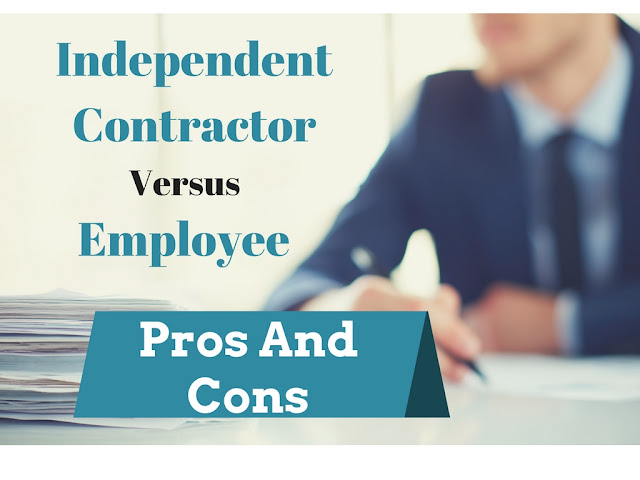An independent contractor is classified as a person who’s self-employed and uses an independent contract arrangement to supply services to a customer in exchange for an agreed upon fee, which might contain some commission. The independent contractor is in charge of delivery or end product of the service, but the company does not have any supervision on the way in which the job is completed.
An employee is an individual who is on the payroll of the company and is paid by wages, fee, or a mix of commission and base pay. The employer additionally defines employees as their work systems are frequently subject to performance evaluations.
The there are a lot of perks to being an IC. An independent contractor has more flexibility when compared to a full time employee. The contractor can be his manager, by developing his agenda, working without close oversight, and taking on a light or heavy workload as he sees appropriate. This provides open-ended profit possible. Working for multiple employers also gives contractors more job protection in a single sense, because one company cutting back on staff or going is not going to ruin the entire flow of income of the contractor. On the flip side, for an employee, it might be more appealing to have a more steady income flow, the possibility of progress, as well as a predictable program.
Independent Contractor vs. Employee:
Pros And Cons
Independent Contractor vs. Employee:
Pros And Cons
Three main categories employed by the Internal Revenue Service to find out if the status of one is either an employee or an independent contractor are the following:
* Behavioral Control – Who determines the way the work is completed and what tools or materials to utilize so that you can do the task? Employers can just minimally control contractors’ behavior. Contractors possess the liberty to finish the work in any way they believe is most efficient, to subcontract the work they receive and establish their special hours and workplace.
* Financial Control – Who has a substantial monetary investment in the job? Who pays the expenses? Who gets the capacity to realize a gain or loss in work? The financial control means that contractors’ payment standard is based on a “per task” or “piece work” pay. Consequently, the amount of energy plus time contractors expends on the task they create is as much as the contractors wish, not their employers. Employees also may receive added benefits, for example, retirement plans or health coverage, which independent contractors tend not to receive.
* Relationship of the Parties – Does a written contract exist involving the parties that describe who’s responsible for what? Typically, independent contractors aren’t asked to sign such contracts that are lawful. Contractors can work with many employers if they choose – even competing employers.
Tips For Independent Contractors
Here are a few tips that will guarantee a productive career as an independent contractor. Understanding what you must do to be successful will help to ease any concern about taking any job which you would possibly have:
Here are a few tips that will guarantee a productive career as an independent contractor. Understanding what you must do to be successful will help to ease any concern about taking any job which you would possibly have:
Pay Your Own Taxes– You must pay taxes on each cent which you bring in if you are working at/from home. The business that is paying you does not take taxes just like a regular physical occupation. It’s your responsibility to submit your payment quarterly also to put aside the cash. It’s an excellent notion to talk to a tax professional to see exactly what a sufficient sum for one to put aside from every pay to be certain that you have enough to cover your taxes. You can also get tax write offs for business expenses with the tools and equipment used for your business. Keep all receipts!
Benefits– Benefits are another matter that independent contractors which work from home need to ensure independently. From retirement to medical, it’s your decision to find plans and make the payments. You will find lots of businesses which focus on individuals who are self-employed. You can do a search or even check out ideas at your favorite work from home forum.
Backups– Many businesses hire only when they need. What this means is that when the orders quit coming in or when a job is finished, you might be out of a consistent check. There are lots of methods that this can be combated by you. It’s much better to possess a couple of businesses which you work with to ensure that you simply always have someplace to go when you must, to earn some cash.
Backups– Many businesses hire only when they need. What this means is that when the orders quit coming in or when a job is finished, you might be out of a consistent check. There are lots of methods that this can be combated by you. It’s much better to possess a couple of businesses which you work with to ensure that you simply always have someplace to go when you must, to earn some cash.
Emergency Savings Account– Lastly, it is vital to set up an emergency saving account with at least a year’s worth of living expenses set aside. When your revenue is not regular and guaranteed, it’s indeed more significant to own such a backup plan set up.
Employed as an independent contractor may be incredibly rewarding, pleasing and lucrative. The pros do outweigh the cons when you evaluate beyond understanding the dynamics of your chosen field, nevertheless, in addition, you must realize how you can guard yourself, as well as your assets and the best way to keep the business functioning smoothly. The upsurge in the number of companies outsourcing work to independent contractors is remarkable. We are not discussing a gradual upsurge. The increase reveals no indication of slowing down.



Leave A Comment